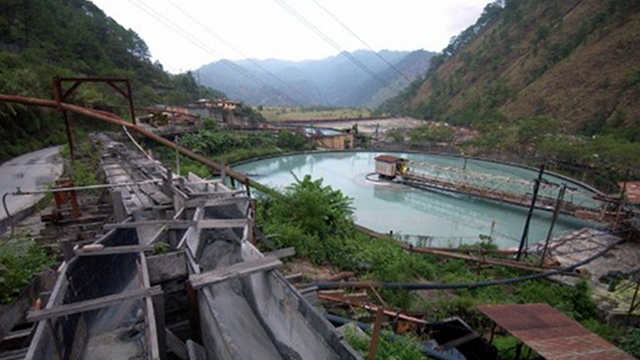SUMMARY
This is AI generated summarization, which may have errors. For context, always refer to the full article.

MANILA, Philippines – Concern over the impact of the Philex mining spill has reached Congress. On Wednesday, October 10, Kabataan Representative Raymond Palatino filed Resolution No. 2823 calling for a House probe into the Philex Mining Corp tailings pond leakage in Benguet.
The resolution directs the House Committees on Natural Resources and on Ecology to conduct a joint on-site investigation on the “environmental and socio-economic impacts of the Padcal Mine Disaster.”
Palatino accused Philex of imposing a “media blackout on this disaster that has prevented the entry of independent investigations and even actual media coverage in the facilities of the Padcal Mines, resulting in the monopoly of the Philex management on information regarding the actual conditions of their facilities in question.”
Mine tailings leaked several times from the tailings pond of the Padcal mine of Philex in Benguet between August and September.
Fact-finding mission
Palatino filed the resolution in response to the result of a fact-finding mission recently conducted by Church and civil society groups.
The fact-finding mission stressed the need for an immediate and impartial investigation on the impact of the spills on the affected watershed, people and communities.
In his resolution, Palatino reiterated the recommendations made by the mission:
- Conduct a technical assessment on the structural safety of TP3 (tailings pond)
- Review the status of earlier tailings pond TP1 and TP2
- Conduct a regular and continuing laboratory testing for water, fish and environment quality in TP3, Balog River and Agno River
- Conduct a Bathymetric (study of underwater depth) survey on the collapsed TP3 and the San Roque Dam (SRD)
- Conduct an impact studies on rice farms, irrigation systems and downstream communities where the mine tailings flowed from SRD to Pangasinan and Tarlac
From September 16-17, participants in the mission interviewed local officials, responsible government agencies, and affected communities in the town of Itogon in Benguet.
About 45 families, mainly indigenous peoples from the Ibaloi tribe, reside near the mouth of the juncture of Balog and Agno Rivers.
Participants of the mission included the following:
- Catholic Bishops Conference of the Philippines – National Secretariat for Social Action, Justice and Peace (CBCP-NASSA),
- Climate Change Congress of the Philippines (CCCP)
- Philippine Misereor Partnership Inc (PMPI) Northern Luuzon Cluster
- Peace Foundation Inc
- Pambansang Kaisahan ng mga Magbubukid ng Pilipinas (PKMP)
- Katribu Indigenous Peoples’ Partylist
- Cordillera Peoples Alliance (CPA)
- Caritas Baguio
- Community Volunteers Missioners (CVM)
Worse than Marcopper?
Citing MGB data, the independent fact-finding mission said that the the Philex mine spill is 1,300% higher than the Marcopper accident in Boac, Marinduque of 1.6 million metric tons. Dr Esteban C. Godilano, resident scientist of the Climate Change Congress of the Philippines, said the Philex mine tailing leak is that massive.
MGB Director Leo Jasareno said in a letter that the tailings fee of P1,034,358,971 has been computed to be payable by Philex based on the 20,689,179.42 metric tons of discharged solids to Balog River.
Earlier, Manuel V Pangilinan, chairman and chief executive of Philex Mining Corp, the Philippines’ largest gold mine, admitted that the leak’s impact was “severe and substantial.”
But Philex contested the fine since the spill was caused by “force majeure.”
“One of the most basic principles of fairness and of law is that no party should be held responsible or be penalized for events over which it has no control,” Philex vice president Mike Toledo said.
But Toledo stressed that the company is exerting efforts “to remediate the effects of the spill on the environment and surrounding communities even if caused by an event outside its control.”
He added that they are willing to shoulder the cost of clean-up efforts in affected rivers, and the lost livelihood opportunities for those in nearby communities.
Defend patrimony
Defend Patrimony, a group opposing large-scale mining, welcomed Palatino’s resolution.
“Congress should prioritize this initiative as the government’s capacity to regulate or penalize an erring mining industry, or lack thereof, is in question here,” Defend Patrimony convenor Leon Dulce said in a text message.
The resolution seeks to look into the “interplay of pertinent mining and environmental policies such as the Mining Act of 1995 and Executive Order 79 (Aquino government’s mining policy) in responding to the disaster.”
“The mining disaster poses a great danger not only to the lives of communities but to the future of our young people as well,” Palatino told Rappler, justifying why he initiated the filing of the resolution. – Rappler.com
Read the Blog on the 2012 Mining Conference for a blow-by-blow account of issues being discussed.
For the existing mining contracts in the Philippines, view this #WhyMining map.
How does mining affect you? Are you pro or against mining? Engage, discuss & take a stand! Visit Rappler’s #WhyMining microsite for the latest stories on issues affecting the mining sector. Join the conversation by emailing whymining@rappler.com your views on the issue.
For other views on mining, read:
| Yes to Mining | No to Mining |
More on #WhyMining:
Add a comment
How does this make you feel?
There are no comments yet. Add your comment to start the conversation.